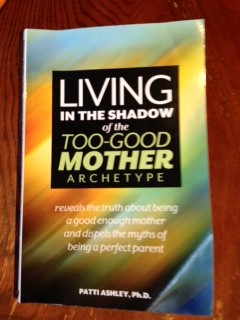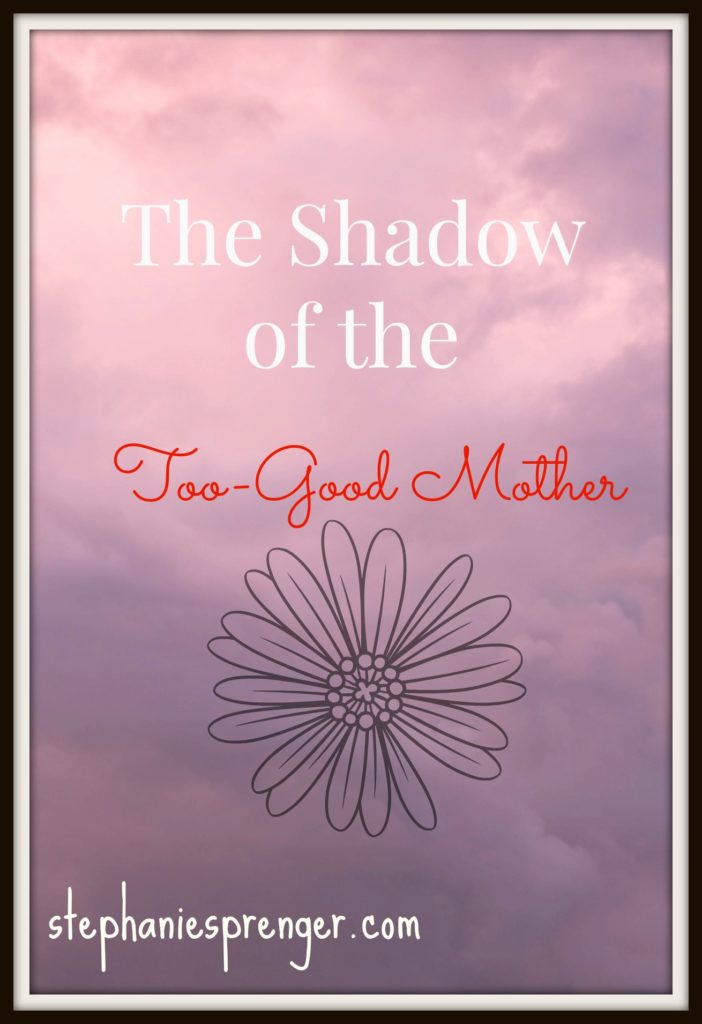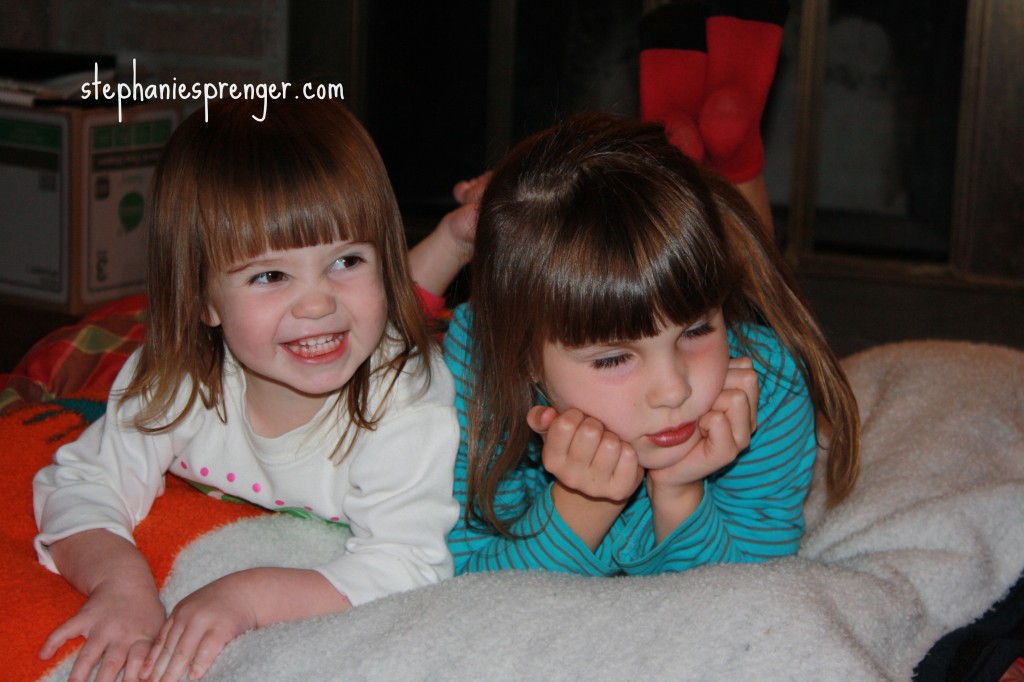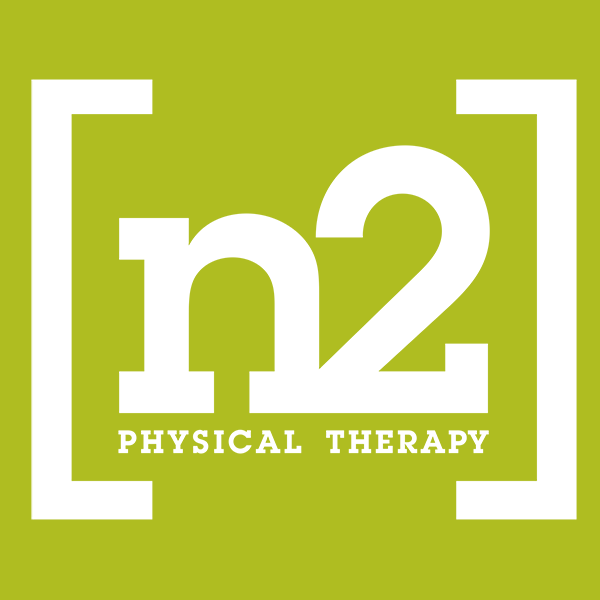As a writer, avid reader, and mother of two young girls, I often feel like I am drowning in information about parenting- the latest research, new techniques, ideas for crafts, meals, games. As Sarah Millar’s recent article in the New Yorker humorously sums up, parents have quite possibly hit their saturation point when it comes to absorbing any new information on the art of parenting. But I’ve found that there’s a distinct difference between reading about parenting and reading about motherhood. I absolutely love reading books about the experience of motherhood, especially ones that illuminate the not-so-warm-and-fuzzy aspects of raising children.
I recently finished a new book about motherhood that took the subject of the myth of the perfect mother– and how it is damaging families everywhere– to a whole new level. Written by psychotherapist Patti Ashley, Ph.D, Living in the Shadow of the Too-Good Mother Archetype, stood out among the cascade of other motherhood books I’ve read since having my first child. Like All Joy and No Fun, the most recent Brilliant Book Club read, it is a book about mothers, not necessarily about children. Dr. Ashley connected with me several months ago, and she graciously sent me an advanced reader’s copy of this book so that I could review it; I loved it so much that I wrote this blurb:
In a parenting culture characterized by guilt, self-doubt, and competitiveness, Dr. Ashley moves beyond rallying mothers to accept themselves and calls us to dig deeper. With thoughtful research and empowering exercises, Living in the Shadow of the Too-Good Mother Archetype is one of the most meaningful, helpful books about motherhood that I have ever read.
What I appreciated most about this book was that rather than simply assuring us that we should stop judging ourselves and ditch the guilt, it provided actual tools to help women explore their shadow selves and move closer to acceptance, understanding, and wholeness. There is a questionnaire (I just love quizzes!) to help you determine how the shadow aspects of motherhood are playing out in your life, and the book also includes a dynamic and effective motherhood meditation as a resource. Dr. Ashely incorporates thought questions and exercises at the end of chapters to help integrate the concepts and identify how the shadow of the “too-good mother” may be appearing in your life.
What Does Shadow Work Mean?
My background and interest in psychology is one of the reasons I was so excited to read this book. I majored in music therapy, minored in psychology, and interned at a mental health complex after college, but in addition to studying psychology, I will admit that I love doing my own work with therapists as well. In fact, I think everyone should be required to work with a therapist at some point in their lives- it’s amazing what you can learn about yourself if you really dig into the dirt of your unconscious mind. Dr. Ashley explains, “The purpose of this book is to help women shed light on the shadow aspects of the too-good mother archetype, and to bring into consciousness the heightened levels of awareness that are necessary for individual as well as collective healing.” So what does that mean exactly?
Swiss psychotherapist Carl Jung explains archetypes as universal patterns that are highly developed and reside in the collective unconscious, ie, the mother, the child, the maiden, the wise man, the flood. Jung also asserts that each of us have “shadow aspects” of ourselves that contain parts of our personality of which we are primarily unconscious and are generally considered to be negative. Motherhood brings its own unique shadow elements:
- guilt
- feeling inferior or not good enough
- feeling emotionally and physically depleted
- depression
- deep self-doubt and shame
- judging ourselves or feeling judged by others
Dr. Ashley discusses how past generations’ gender roles and unhealthy familial expectations have impacted modern motherhood– including Betty Friedan’s “problem that has no name”– and emphasizes how important it is for our generation to undo the damage of the previous decades’ skewed ideals. As to how we begin correcting some of these problems, she states, “I am convinced that in order for change to happen, women must tell their stories.” Amen. I am all for women telling their stories.
Four themes leapt out at me as I read Living in the Shadow of the Too-Good Mother Archetype, highlighting like a fiend. The titles of these chapters perfectly encapsulated them.
Mothers as Martyrs
Dr. Ashley titled this chapter, “I’ll Take the Wing,” paying tribute to her own mother’s habit of volunteering to eat the least desirable part of the chicken at family dinners. The title made me both chuckle and squirm; my reluctance to succumb to the sacrifices that seem to go hand in hand with motherhood often makes me feel inferior. I have no doubt that my own mother would have sprung to eat the cast-off food her children rejected, but I have been known to serve my children the burned quesadilla and prepare a better one for myself. Ouch.
Setting Ourselves Up For Failure with Unattainable Expectations
“The Martha Stewart Complex” sums up many of the frustrations women experience as they blindly strive for perfection in their homes and families. This unfortunate syndrome has taken on new life in this age of social media (Pinterest-Perfect Moms, anyone?), and the sense of guilt we feel at our inability to be everything we think we should be is responsible, I believe, for the self-imposed and media-fueled “Mommy Wars” that became infamous a few years ago. We silently judge ourselves every day, but judging other mothers seems to be a safer option, and perhaps less painful. I think becoming conscious of the guilt, judgment, and feelings of inadequacy caused by these unrealistic expectations would do wonders for mothers everywhere. Heal yourself and heal the community as a whole, right?
Mothers and Self-Care
This topic resonates deeply with me; one of my biggest crusades is helping mothers, myself included, remember that their needs must be on the table, or they are doing a disservice to their entire families. Dr. Ashley’s “Oxygen Mask” chapter references the “secure your oxygen mask before helping others” metaphor. When my oldest child was a toddler, I read a book by the incomparable late Susan Jeffers, I’m Okay…You’re a Brat! ; it was the first time I had heard the oxygen mask metaphor, and it brought tears to my eyes. At that stage of my life, I was feeling so depleted; I was also experiencing guilt about the resentment I felt at putting so many of my self-care needs on the shelf. Every day that I teach my parent-child classes, I interact with women who are struggling to make their own needs a priority. Imagine how our culture would change if mothers were able to really find the support they needed to care for themselves and their families in a more balanced way- it seems almost utopian.
The Paradox of Parenting
When I reviewed All Joy and No Fun, I mentioned that “the paradox of modern parenthood” was my favorite subject for reflection, discussion, and writing. Dr. Ashley’s chapter, “Demeter and Persephone” did wonders to clarify this struggle with the simultaneous joy and pain brought about by motherhood. She maintains that all of us– parents and non-parents alike– must learn to tolerate a “tension of opposites.” There are many days when it feels that holding this tension of opposites is my most challenging work as a parent. My husband and I have begun to discuss the possibility of adding a third child to our family, and whenever I mull over experiencing pregnancy and infancy again, I am equally torn between the poles of, “What if I never get to do that again?” and “What if I never have to do that again?” It is nearly impossible for me to discern whether it would be more painful not to experience that beautiful time of life just once more or rather to plunge myself back into that chaotic, sleepless, survival mode. The paradox contains it all- the intensity of both extremes.
I think there is a lot of validation available to mothers nowadays- parenting blogs, Facebook groups where moms can gripe and find support, and books that comfort us by reminding us that our ambivalent feelings are normal. But sometimes the shadow aspects of motherhood are so deeply buried, so unconscious, that we need to move beyond patting ourselves on the back and telling ourselves we’re okay. We need to do the work.
This book is a great opportunity for women who are willing to really get to the root of some of their struggles, whether they revolve around unnecessary self-sacrifice, depression, feelings of inadequacy, or depleted maternal reserves. You might be surprised at how liberating– and even fun!– it can be digging in the dirt of your shadow self. And guess what? Your children will even gain something from your growth. Our children undoubtedly benefit when we become self-aware and can teach them how to truly know themselves. In the words of Dr. Ashley,
Children need an enlightened witness, not a perfect mother.
Amen to that.
You can order Living in the Shadow of the Too-Good Mother Archetype here.
Learn more about Patti Ashley, Ph.D. at her website.













Stephanie, I’m in awe of how eloquently you write a book review. Wow. Your endorsement compels me to buy the book, yet I’m also a little nervous to actually read it. The topics/chapters you addressed all make me jumpy – yikes. Well done.
Allie, thank you for such a fantastic compliment! I encourage you to buy the book and take it in small doses- one little chapter at a time! It’s fascinating work. 🙂
You are such a great writer, and of course, I want to read it now too!! I have a post scheduled for tomorrow that is kind of about guilt….so this was a really interesting book review to read. I think I will add it to my list! 🙂
This sounds such a worthwhile book for mothers. I loved that last quote: “Children need an enlightened witness, not a perfect mother.” My girls are teenagers and since they were quite small I’ve been working at becoming more conscious, more aware and to guide them not to lose the awareness they already had. I suspect it’s a journey without end, that we grow all our lives if we are open to it.
One of my daughters was talking recently about the way girls are taught to see themselves and then caught herself saying something she’d just painted “wasn’t that good.” When we discussed it further I said that I’d felt that way often and had tried not to pass it on. She replied that I would have, but it wasn’t my fault because it wasn’t conscious. This is so important – even when we have cognitive awareness of something we aren’t always able to make the changes we’d like, maybe because of other unconscious beliefs.
If we make our “flaws” into something we try to correct in ourselves we then miss the opportunities they offer to know ourselves more fully. And what we pass on to our children is of course then trying to be perfect. Yet, your point about not just ditching the guilt is really important too – if we just say, “This is how I am and there’s nothing I can do about it,” that helps nobody. Accepting ourselves as we are does not mean shutting out change, but the exact opposite. Like you say, life is full of paradox!
I really enjoyed this post!
I love your review- it’s incredibly informative and this book sounds worthy of every mother’s shelf. I love that we were both Music Therapists and have that in common!! You brought me back to my years in inpatient psych, doing music therapy and all kind of other powerful groups and individual therapy!
This book truly sounds like a deeply profound journey through self awareness and healing and every mom needs some of THAT. 🙂
I really enjoyed this review and will be getting the book. I think the shadow of the too-good mother affects both mothers and fathers. I see a tendency for all of us to put our children first because we love them. But sometimes we don’t give ourselves a break.
This weekend, for example, my husband asked “Do our daughters need weekly ballet lessons AND yoga? Can we cut one out?” And I was quite grateful that he said that. We’re both exhausted with the demands of work, home and everything else.
Great review Stephanie! This seems like a really helpful and interesting book, thanks for pulling it out of the parenting slush pile for us. Btw, I’m a total sucker for a good quiz 🙂
Awesome blurb, too!
Ooh, I loved this review and the book seems so interesting. I am a sucker for quizzes as well, btw. It’s so scientific, right??? 🙂 In all seriousness: I was struck in particular with the section on paradoxes. We *all* need to learn to “sit with” ambiguity and distress. All of us. It’s one of the precepts of Dialectical Behavioral Therapy (Google Marsha Linehan), which is used mostly to treat Borderline patients but I think can be useful for us all. Perhaps our intolerance of the tension she mentions is there all along, but it really rears its ugly head when children enter the picture. Those priceless but economically worthless children, as Jennifer Senior writes.
Anyway. Lots of food for thought, thanks for a great post. xo
You sold me on this one lady. I think that this is probably the most intriguing book reviews I have ever read!
I love books that tweak your mind and make you reflect upon yourself.
I just wanted to add on the self care portion…
We must take care of ourselves first and lay the guilt behind. We are still humans that need nurturing under all of the roles (yes roles because we are moms after all). I think that is what holds us back because we are continuously putting others needs before our own. Even if you schedule 30min a day to read or one night a month to have an entire day or evening or both to spend with friends, that makes the world of a difference.
You are amazing. How is it that you can take a book review and make me think about parenting, myself, my life, want to go back to therapy, and feel utter relief that you’ve served your girls the burnt quesadilla?? I adore you. As you know, I don’t read a lot of parenting books but this one sounds like a must. And the photo of the girls is awesome – the look on Izzy’s face! Ha! Tragic indeed.
And here’s to women telling their stories. I’m so glad that you tell yours and am honored to have you as a friend.
Wow. That sounds like a powerful book. Thank you for digesting it for me 🙂 Sometimes I am scared to read books like that because I am forced to look at a side of me I don’t want to see. But…. that is the point!
Stephanie,
Rather than listing books for parents to read that emphasize the importance of teaching your child to potty train in a day, creating attachment in a prescribed manner, wouldn’t it be great if we simply sat with moms and talked about how motherhood really makes them feel? Dr. Ashley’s book could certainly provide insights and information to assist all parent group leaders (like you and I) in getting back in tough with their emotions and intuitions. To trust themselves and to believe that their child is truly lucky to have them as their mother!
In kinship,
DeAnn
Stephanie: I am so in awe of the comments and responses to your review. You did such a fantastic job relaying the messages in the book. Happy Mothers Day to you! Much love, Patti
Thank YOU, Patti, for such an amazing book!